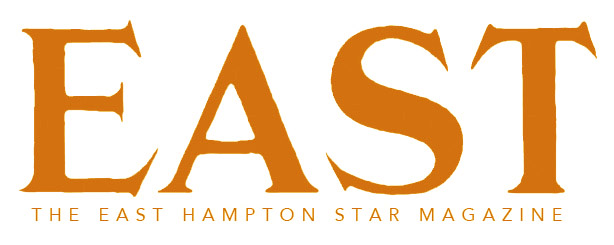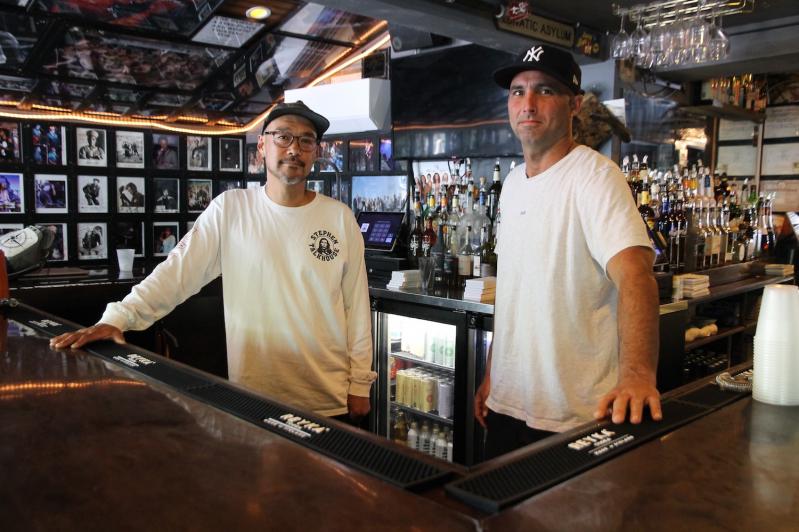In 1989, Eiji Shiga was the new kid in school, moving from Tokyo to East Hampton with his mom, brother, and sister. He was nine years old and entering fourth grade, and the teacher asked for a volunteer to show him around. Colin Lillie raised his hand.
What happened next was straight out of an episode of The Simpsons, with a Bart-type kid showing a Millhouse around, snapping his gum, pointing out the library while saying, “This is where I don’t go to read.”
“He tells me, ‘I just dumped my girlfriend,’ ” recalled Shiga, who at the time spoke “a decent amount” of English, he said. “But in my head for a minute, I thought, ‘Dumped. Dumped?’ There was no slang in Japanese that I could relate to. I just asked him, ‘Water? Milk? What did you dump on her?’ He looked at me like, ‘You’re weird, man.’ ”
So began a 35-year friendship that took Shiga and Lillie from the playground to grown-up besties, supporting each other like therapists through ups and downs, plowing headfirst together through milestones like getting married and having kids, and having fun — lots of fun — bartending together, full time, at the Stephen Talkhouse in Amagansett for the last 25 years.
A lot has changed on the South Fork in that time. While others were busy preserving farmland, open space, and historic houses, Shiga and Lillie made it their mission to preserve the hometown atmosphere at the Talkhouse.
“The foundation is friendship and community. That’s where it starts,” Shiga said. “The people who come in get a vibe from us as good friends. It makes people feel more comfortable. In this town, with all the service-industry jobs, a lot of places rotate staff so much. This bar has five people behind the bar for over 20 years and others not behind the bar for 20 years. Our crowds may have changed, but our staff is still the same as when we first started doing it — back when we weren’t the hip place to be.”
“This is a romper room for adults,” Lillie added. “Their safe haven to let loose. We’re like lifeguards watching over them. We walk that line of controlled chaos.”
They were both behind the bar on Memorial Day weekend in 2009 when Martin Sexton played through a hurricane. The power went out. This was back before the Talkhouse got central air-conditioning — insert “hot as” comparisons here.
“He hardly missed a beat. They grabbed their acoustic instruments,” Shiga said. “The first thing I did was grab all the money because it went superdark,” Lillie said. “We got as many candles as we possibly could. A lot of people talk during shows and you have to shush them, but we didn’t have to do that.”
“Everyone understood that there was magic happening,” Shiga said, describing it as a candlelight concert years before such things were done on purpose. “In his last song — I can’t remember what it was, I should look it up — the chorus says something about light, and as he hits that chorus, all the lights come back up and the whole place erupts.”
Together they have served patrons from all walks of life while listening to a soundtrack of live tunes by Coldplay, Jimmy Buffett, Mumford and Sons, and the Killers. “John McEnroe bartended with us while Coldplay was playing,” Lillie recalled.
Lillie and Shiga pride themselves on the fact that they aren’t mixologists flipping glasses and muddling blackberries for a craft mojito. “People ask us, ‘What do you like to make?’ ” Lillie said. “I like to open beers.”
“When people ask me what my special is, I say, ‘room-temperature tequila in a plastic cup served with no garnish and no napkin,’ ” Shiga added.
Shiga has done a fair number of tequila shots with people over the years, but Lillie doesn’t actually drink. He prefers straight soda water.
There’s no such thing as the asshole tax at the Talkhouse, but “when an out-of-town, 21 or 22-year-old privileged person who feels entitled comes in, they’re gonna get checked,” Shiga said. “We get to teach people how to act in a bar — here and the Dock in Montauk. It’s so necessary in bar culture, especially for kids who missed years of it in Covid. You don’t touch a bartender, you do not tap your credit card on the bar. These are the rules that we end up teaching.”
“It’s nice. We don’t have to bite our tongue and treat people a certain way,” Lillie said, “but you have to be thick-skinned and patient for sure.”
Bartending jobs at the Talkhose are earned, not given. Lillie was an onsite roadie as a teenager, unloading equipment for the musicians. Then they got into the “minor leagues” (Shiga’s words) as barbacks, graduating to primetime only when the full-timers
needed a night off. They looked up to and backed up their predecessors, guys like Larry, Phil, James, and Matt — no last names necessary, because anyone who needs to know already knows.
“You’re a ‘vulture shifter’ first. Then Peter [Honerkamp] and the other guys see you get proficient and give you the shot,” Shiga said. “The title of bartender is a very hard one to attain here. There are bartenders who come in in the spring and apply for the job and the response they get is, ‘Sure, when someone dies.’ ”
The mention of death makes them pause. During Covid, they lost a close friend, Paul Jones, the doorman who’d longed for a chance to tend bar. “We’ve had good people here pass — lifelong friends. That’s tough. Paul Jones was tough,” Lillie said.
“I wish that Paul was here and that we were talking three ways. We really made something together here,” Shiga said.
After a long pause, he continued, “This is not your everyday, normal job. You see a lot more good than bad.”
They are grateful to Honerkamp, the owner, for the opportunity to keep doing this together. “It’s great. To me it’s a good
way to stay part of the community,” Lillie said. “We appreciate it.”
“There is not another place like it,” Shiga said. “It allows you to be an optimist. A lot of nights are like any other job, it’s a grind, but whether it’s through money or through music or through friendship and laughter, you get really surprised at the rewards.”

